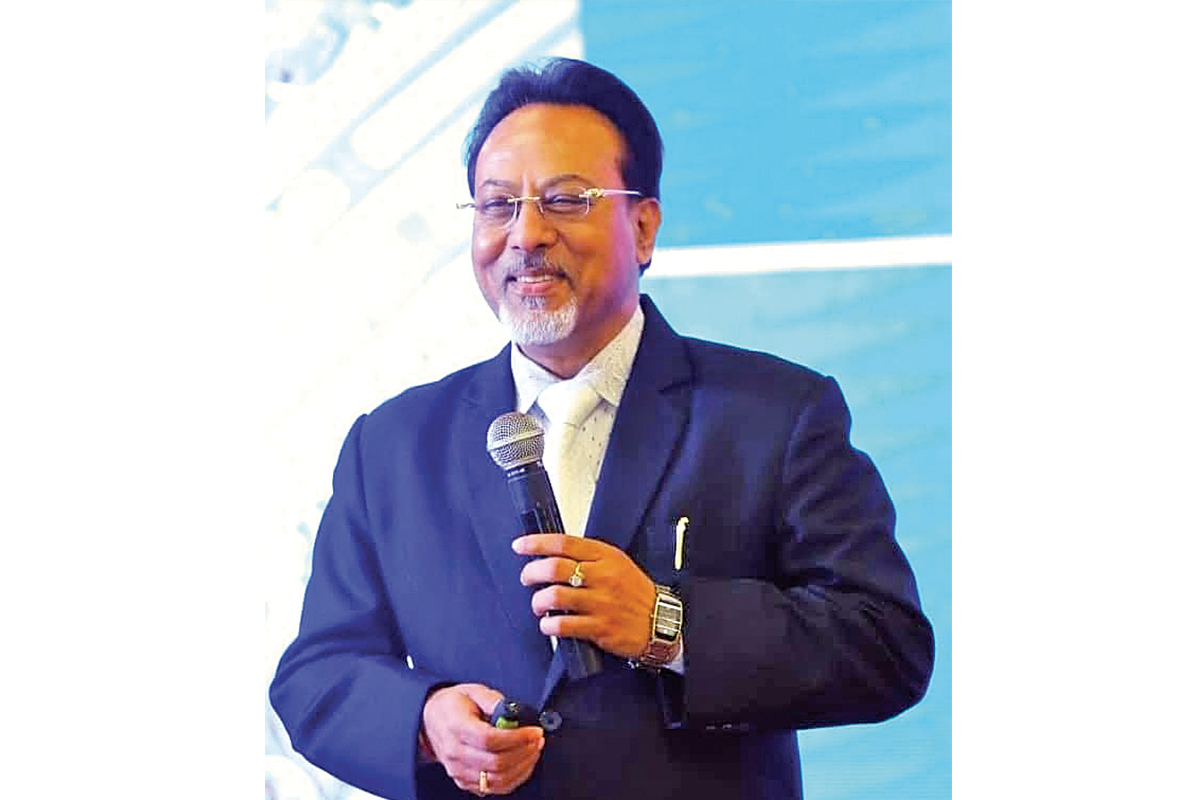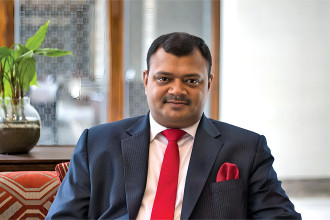
Dr Rakesh Jain
Global Business Guru & Startup Mentor
Like Thailand for tourism, Hong Kong for shopping, Singapore for logistics, China for manufacturing, Nepal can focus on adventure, tourism, hospitality, food and restaurants, food processing and services. Nepal can also position its people as its competitive edge because such hospitable, hardworking, sincere and heartful people are difficult to find in the world
Dr Rakesh Jain is a name synonymous with business transformation and strategic growth. With a remarkable career spanning five decades, he has guided industries, institutions and entrepreneurs toward sustained success. As the former CEO of the Prestige Group, he took the company from the ground up to INR 500 crores in turnover, earning recognition among the Top 100 agribusiness firms in the developing world and the Top 20 forex-earning companies in India. His leadership also led to one of the most successful IPOs of the year. Beyond business, he established the Prestige Institute, which today ranks among India’s top 25 business schools, and continues to serve as a guest faculty member at the Indian Institute of Management, Indore.
A mentor to entrepreneurs, Dr Jain has trained over 200,000 business leaders in growth strategies and transformation, an achievement recognised by the Golden Book of World Records. His work has generated an estimated ₹10 lakh crore in business growth, earning him an Honorary Doctorate for his contribution to the economy.
Over the years, he has been honoured with multiple national and international awards, including the Bal Samman Award from late Indian Prime Minister Indira Gandhi, the Outstanding Manager Award from the All India Management Association, and the Citation for Meritorious Services from Rotary Foundation, USA. A prolific author, he has written ten books under the series Managing for Success capturing insights from his decades of hands-on experience.
In conversation with Business 360, Dr Jain shares insights on how Nepal’s business community can leverage its strengths, embrace technology and adopt innovative models to achieve sustainable growth in the evolving South Asian economic landscape. Excerpts:
What strategic insights would you offer business leaders in Nepal aiming to scale operations effectively in the region?
With over five decades of my top-level experience in 15+ industries, 5+ trading businesses, 10+ NGO’s and institutions, I have devised a ‘Secret Business Growth Code’ that is a sure success recipe for any kind of business in the world. I would be glad to share this code with anyone interested.
How have you navigated regulatory and infrastructure challenges in India, and what lessons could Nepal apply?
Compliance to regulatory framework is not optional, it is essential. The key is while you comply, you still find legal ways to thrive. We need to be ingenious and innovative to find newer ways to do better than our competitors both in your own country and the world.
Infrastructure used to be a huge limitation for Indian businesses but as we opened up and reforms took place, things are improving. Concepts like BOT, toll highways, public-private partnerships, privatisation and disinvestments have helped a lot.
One of my mentors is Dr Raghunath Mashelkar, who coined a concept called Gandhian Engineering which means MLM; more from less for more. This concept focuses on how we can focus on getting maximum output from minimum input, which can benefit the most. For any nation with resource crunch, this can go a long way. However, we should also create pressure groups for better infrastructure needs for business and industry
Which sectors in Nepal do you see as most ripe for cross-border collaboration or investment?
Like how there are core competencies of people and companies, similarly, there are core competencies of nations also. You need to evaluate what are the core competencies of Nepal as a nation. Like computing for India, trading for Hong Kong, manufacturing for China, and tourism for Thailand.
In my opinion, Nepal’s business focus should be on a multi-pronged approach targeting several key segments. Firstly, the country should capitalise on its natural and cultural assets by prioritising tourism, adventure, food and hospitality, leveraging its stunning landscapes and rich heritage. Secondly, to foster domestic economic growth and self-reliance, significant attention should be given to entrepreneurship, MSME (small manufacturing), and food processing, which can create jobs and add value to local resources.
Lastly, to build a resilient and modern economy, Nepal should invest in and promote the growth of service sectors, specifically education, health, banking and insurance, and other services. This strategic diversification across primary resource-based industries, domestic value addition and modern services will provide a solid foundation for sustainable economic development.
If a Nepali startup wanted to attract international partners, what factors would make it especially appealing?
Any investor, whether it be a private equity, venture capitalist, shark tank or institution will look for the following four factors to make the proposal interesting to him:
a. Idea should be unique and should be solving a major pain point for the targeted audience.
b. Market size should be big enough so that the startup has a scope to scale up.
c. The concept should be focused on great value creation so that with less inputs, huge output can be gained. Example, Apple iPhone
d. Enterprise team should be capable to handle the growth journey effectively. They should complement each other’s capability.
What technology-led strategies have you seen work in India that Nepal might replicate or adapt?
The affordability of technology varies significantly across different levels of businesses. While medium and large enterprises should necessarily utilise high-end tools like CRM and ERP, even micro and small businesses can effectively leverage the integration of day-to-day technologies. Examples of these everyday tech tools include web-enabled businesses, UPI and geo-navigation, as demonstrated by services like Ola, Zomato and Paytm in India.
How can Nepal’s young talent be better prepared to take on global-standard leadership roles?
You see people of Indian origin who have studied in IIT’s & IIM’s are sitting on the top corporate seats worldwide. You should send your children to study in these worldclass, yet affordable institutions. Nepal should ask them to open up their campuses in Nepal. You need to collaborate with top Indian technology and management institutions. Nepal’s youth can do internships and jobs in top Indian companies and startups. Nepal’s businesses should collaborate with Indian businesses, participate in Indian/international business events and do networking. Nepal should invite platforms from India like My Story to also be active in Nepal.
What advice would you give Nepali firms aiming to balance commercial growth with social and environmental responsibility?
The Nepal government and corporate world should propagate and incentivise ‘Triple Bottom Line’ companies, which deliver value to all stakeholders (investors, management, employees, vendors, customers) while also benefiting the environment and society at large. An Indian company, Jain Irrigation, was notably ranked by Harvard University in the world’s top 50 triple bottom line companies.
How can businesses in Nepal build resilience to economic and natural shocks?
This is a critical issue. We must build domestic manufacturing for all essential items and diversify the supply chain. Loans must be provided with caution, recalling cautionary examples like Sahara and Mallya from India. Given Nepal is in a seismic zone, establishing a robust Disaster Relief System is essential. All business activities must have a Plan B and backup. During Covid, India showed great resilience and converted the crisis into opportunity. Building strong internal and external support systems is key. The overseas Nepali citizens network can be of great help.
If you were advising Nepal’s business community over the next five years, what would be your top three priorities?
As a Business Growth Strategist, my top three focus areas would be:
a. Build strong core competency (do it better than your competitor).
b. Build strong systems and processes and lean more on appropriate technology.
c. Build unique and strong Blue Ocean Strategies which will place you in a more advantageous situation.
What role do you see Nepal playing in the broader South Asian economy?
First of all, Nepal should present itself as a peaceful mountain state, working on self-sustainable business models. You need to create a consensus on building its USP. Like Thailand for tourism, Hong Kong for shopping, Singapore for logistics, China for manufacturing, Nepal can focus on adventure, tourism, hospitality, food and restaurants, food processing and services. Nepal can also position its people as its competitive edge because such hospitable, hardworking, sincere and heartful people are difficult to find in the world.






